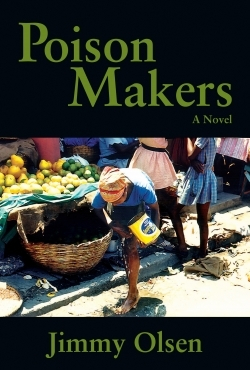
Poison Makers
The year is 1972; the location, the Dominican Republic. The mystery is the death of US Ambassador Adam Quist, which is portrayed by his family as a heart attack. His daughter, who is “not given to exaggerated stories,” suspects murder. The book’s protagonist is a private eye and scuba diving instructor named Edgar Espinosa-Jones (known as EJ), a Dominican-American employee of the ailing Mr. Yancy, whose unnamed client has ordered an investigation into the ambassador’s death. With little evidence and no autopsy to rely on, EJ is sent to discover what connection Haitian voodoo may have to the potential crime.
Much of the Poison Maker‘s draw stems from EJ’s lack of information. Whether the death is motivated by political intrigue, or by more common reasons such as power, revenge, or lust remains unknown and at stake until the end of the novel. Olsen, author of Things in Ditches, enables readers to immerse themselves in EJ’s journey as he transitions from incredulity to the knowledge that one of the country’s most bloodthirsty voodoo sects has targeted him. Drawing from his time living in Santo Domingo, Olsen creates local flavor that layers colonial vestiges with more contemporary elements and city scenes with rural ones, transporting readers from catacombs to impoverished neighborhoods, from urban hotels to the family farm. He populates his story with several characters, including Carmen, a saucy housekeeper employed for sometimes cringe-inducing comic relief; Sonja Cadavid, a Cuban exile and agent for unseen forces, and EJ’s lover); Mickey Alba, the quintessential cop whose loyalty is repeatedly proven through violent acts; and a villainous duo, among others.
Although its finale hurries toward dramatic, somewhat predictable, conclusions, Poison Makers offers more than a treacherous island adventure. Without rendering judgment or offering justification, Olsen asks readers to weigh vigilante justice against justice achieved through lawful procedures. In EJ’s words, speaking of the human tendency to be consumed by hatred, “This was the way of the world—the damaged and the dead. And while I condemned myself a fool, I knew that road led to perdition, and I would never take it.”
Reviewed by
Karen Rigby
Disclosure: This article is not an endorsement, but a review. The publisher of this book provided free copies of the book and paid a small fee to have their book reviewed by a professional reviewer. Foreword Reviews and Clarion Reviews make no guarantee that the publisher will receive a positive review. Foreword Magazine, Inc. is disclosing this in accordance with the Federal Trade Commission’s 16 CFR, Part 255.
